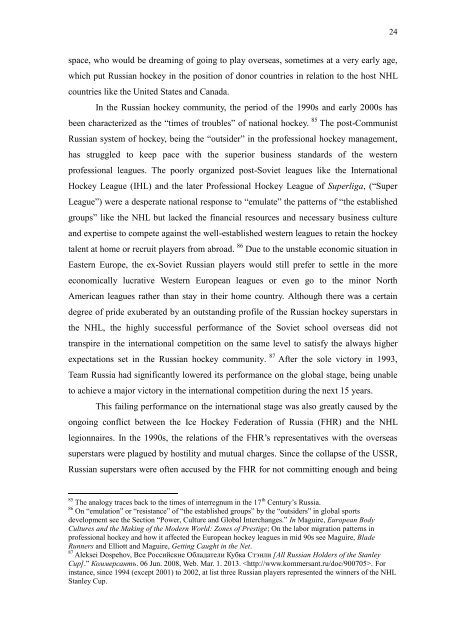University of Turku Faculty of Humanities Baltic Sea Region ... - Doria
University of Turku Faculty of Humanities Baltic Sea Region ... - Doria
University of Turku Faculty of Humanities Baltic Sea Region ... - Doria
You also want an ePaper? Increase the reach of your titles
YUMPU automatically turns print PDFs into web optimized ePapers that Google loves.
24<br />
space, who would be dreaming <strong>of</strong> going to play overseas, sometimes at a very early age,<br />
which put Russian hockey in the position <strong>of</strong> donor countries in relation to the host NHL<br />
countries like the United States and Canada.<br />
In the Russian hockey community, the period <strong>of</strong> the 1990s and early 2000s has<br />
been characterized as the “times <strong>of</strong> troubles” <strong>of</strong> national hockey. 85 The post-Communist<br />
Russian system <strong>of</strong> hockey, being the “outsider” in the pr<strong>of</strong>essional hockey management,<br />
has struggled to keep pace with the superior business standards <strong>of</strong> the western<br />
pr<strong>of</strong>essional leagues. The poorly organized post-Soviet leagues like the International<br />
Hockey League (IHL) and the later Pr<strong>of</strong>essional Hockey League <strong>of</strong> Superliga, (“Super<br />
League”) were a desperate national response to “emulate” the patterns <strong>of</strong> “the established<br />
groups” like the NHL but lacked the financial resources and necessary business culture<br />
and expertise to compete against the well-established western leagues to retain the hockey<br />
talent at home or recruit players from abroad. 86 Due to the unstable economic situation in<br />
Eastern Europe, the ex-Soviet Russian players would still prefer to settle in the more<br />
economically lucrative Western European leagues or even go to the minor North<br />
American leagues rather than stay in their home country. Although there was a certain<br />
degree <strong>of</strong> pride exuberated by an outstanding pr<strong>of</strong>ile <strong>of</strong> the Russian hockey superstars in<br />
the NHL, the highly successful performance <strong>of</strong> the Soviet school overseas did not<br />
transpire in the international competition on the same level to satisfy the always higher<br />
expectations set in the Russian hockey community. 87 After the sole victory in 1993,<br />
Team Russia had significantly lowered its performance on the global stage, being unable<br />
to achieve a major victory in the international competition during the next 15 years.<br />
This failing performance on the international stage was also greatly caused by the<br />
ongoing conflict between the Ice Hockey Federation <strong>of</strong> Russia (FHR) and the NHL<br />
legionnaires. In the 1990s, the relations <strong>of</strong> the FHR’s representatives with the overseas<br />
superstars were plagued by hostility and mutual charges. Since the collapse <strong>of</strong> the USSR,<br />
Russian superstars were <strong>of</strong>ten accused by the FHR for not committing enough and being<br />
85 The analogy traces back to the times <strong>of</strong> interregnum in the 17 th Century’s Russia.<br />
86 On “emulation” or “resistance” <strong>of</strong> “the established groups” by the “outsiders” in global sports<br />
development see the Section “Power, Culture and Global Interchanges.” In Maguire, European Body<br />
Cultures and the Making <strong>of</strong> the Modern World: Zones <strong>of</strong> Prestige; On the labor migration patterns in<br />
pr<strong>of</strong>essional hockey and how it affected the European hockey leagues in mid 90s see Maguire, Blade<br />
Runners and Elliott and Maguire, Getting Caught in the Net.<br />
87 Aleksei Dospehov, Все Российские Oбладатели Кубка Стэнли [All Russian Holders <strong>of</strong> the Stanley<br />
Cup].” Коммерсантъ. 06 Jun. 2008, Web. Mar. 1. 2013. . For<br />
instance, since 1994 (except 2001) to 2002, at list three Russian players represented the winners <strong>of</strong> the NHL<br />
Stanley Cup.
















